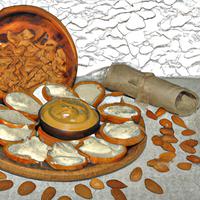
1 serving (50 grams) contains 150 calories, 5.0 grams of protein, 7.5 grams of fat, and 15.0 grams of carbohydrates.

Log this food in SnapCalorie

Nutrition Information
Calories |
710.9 | ||
|---|---|---|---|
% Daily Value* |
|||
| Total Fat | 35.5 g | 45% | |
| Saturated Fat | 4.7 g | 23% | |
| Polyunsaturated Fat | 0 g | ||
| Cholesterol | 0 mg | 0% | |
| Sodium | 592.4 mg | 25% | |
| Total Carbohydrates | 71.1 g | 25% | |
| Dietary Fiber | 7.1 g | 25% | |
| Sugars | 11.8 g | ||
| protein | 23.7 g | 47% | |
| Vitamin D | 0 mcg | 0% | |
| Calcium | 118.5 mg | 9% | |
| Iron | 3.6 mg | 20% | |
| Potassium | 355.5 mg | 7% | |
* Percent Daily Values are based on a 2,000 calorie diet. Your daily values may be higher or lower depending on your calorie needs.
Food Attributes
Source of Calories
About Bread with almond butter
Bread with almond butter is a simple yet nutritious snack or meal option celebrated in many cuisines for its wholesome ingredients and versatility. Typically made with whole-grain bread, it provides complex carbohydrates and fiber, supporting sustained energy and digestion. Almond butter, originating from regions where almonds are cultivated, such as the Mediterranean and Middle East, is a creamy spread rich in healthy fats, protein, and essential vitamins like Vitamin E and magnesium. Together, they offer a balanced blend of nutrients, making this combination ideal for breakfast, post-workout fuel, or a midday snack. Its health benefits include heart-healthy fats, support for muscle repair, and sustained satiety. However, moderation is key, as almond butter is calorically dense, and its added sugars or salts can vary by brand. Pairing it with minimally processed bread optimizes nutrition while keeping this delicious option grounded in health-conscious eating.



